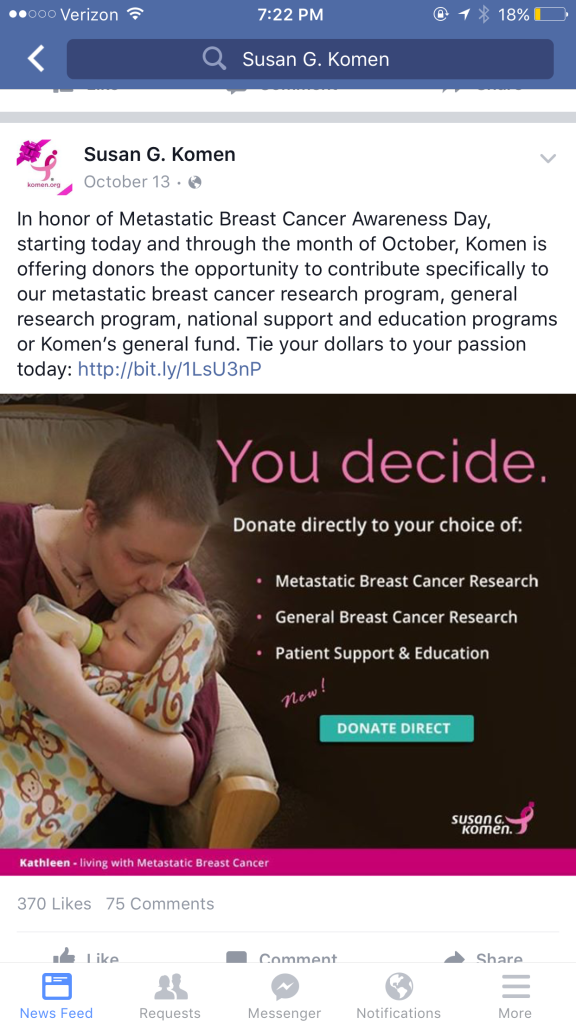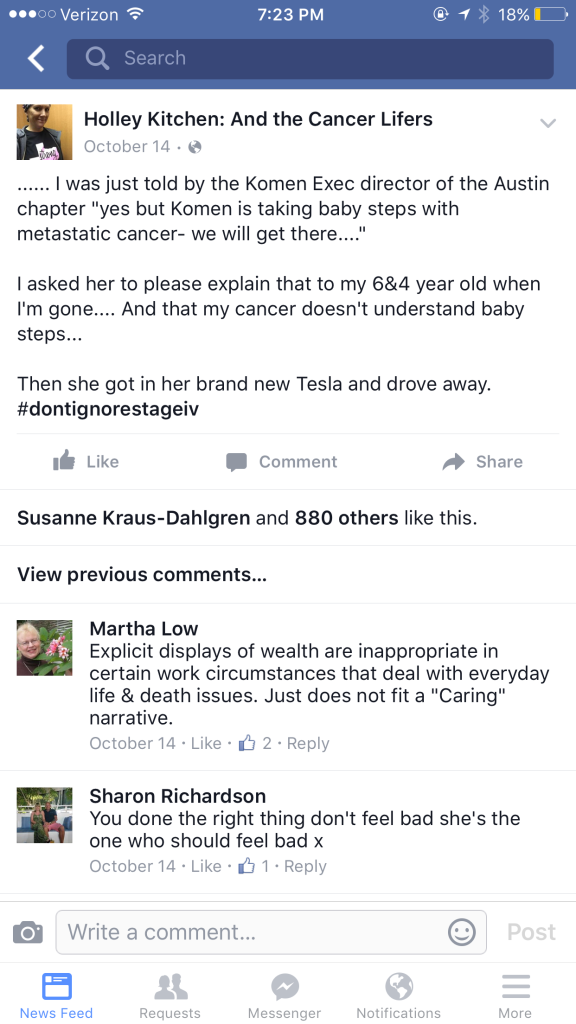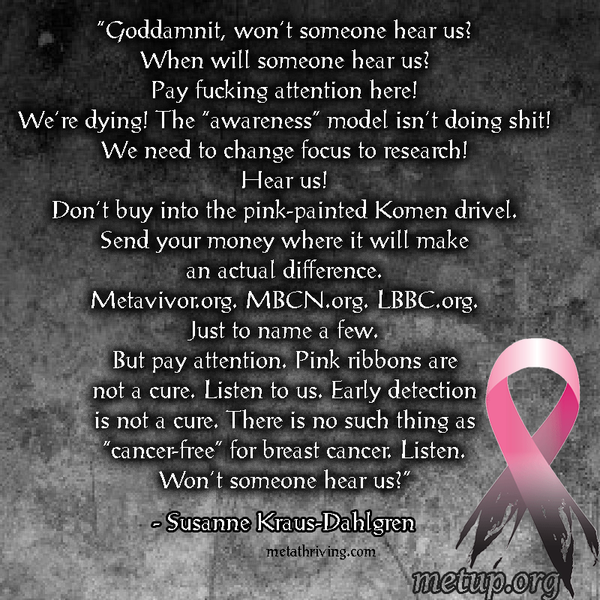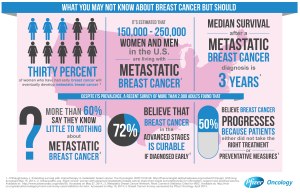In early 2014, I wrote a blog post about why I was against breast cancer juggernaut Susan G. Komen Foundation. It was shared, pinned, tweeted, discussed. While the blog post was shared and liked by many, I don’t know the extent of the reputation hit I may have inflicted upon Nancy & Co. I truly hope I inspired many to donate their money to much more honorable charities.
Well, now I am here to report on where Get Up Swinging and Susan G. Komen still stand. To the surprise of no one, I am very much still anti-Komen, and I do not see that changing any time soon (please see below for a list of organizations doing amazing work).
I do not plan to re-hash all the same reasons I have already cited. That’s the beauty of Nancy & Co: they keep giving us new and improved reasons to despise them and what they are doing to stand in the way of real change. Today would have been my mother’s 69th birthday. She died at the age of 40 from metastatic breast cancer.
Nancy, Nancy, Nancy
In a November 5, 2015 letter to the New York Times, my favorite former CEO was not happy about a very well-reasoned article, “A Growing Disenchantment With October ‘Pinkification,’”also published in the New York Times, which had valid points of views from those not wearing Pink Ribbon glasses. Did Nancy listen to her critics and go, “Man, we’ve really divided the community for which we are trying to help” Did she do any self-reflection and think, “I need to turn my focus back on the promise I made Susie.”
Of course not. Nancy didn’t address any of these real pressing issues currently happening in the breast cancer community. Instead, all she did was regurgitate Komen’s history and ends her op-ed with the tone-deaf statement: “Pink Ribbons matter!”
The Pink Ribbon has enabled Komen to stage Races for the Cure with more than 1.5 million participants, partnerships in more than 150 countries and the engagement of more than 100,000 volunteers.
Oh boy, Nancy. This is another example of why I think you are an evil woman. You don’t get it, and you don’t want to get it. What about those who are on their fifth line of treatment or waiting to get into a clinical trial in hopes for another six months with their families? All you care about is your money-making Pink ribbon empire and your meaningless ribbon, aka the symbol of your life’s wealth.
There was one point in the article, and it’s an excellent point and one that you would think would make The Breast Cancer Charity go, “Holy shit, we seriously have to fix this!”
For all the awareness, they note, breast cancer incidence has been nearly flat and there still is no cure for women whose cancer has spread beyond the breast to other organs, like the liver or bones.
So, congratulations on patting yourself for your ability to rally others around a cause that has affected so many people. But what about the 40,000 dying every year, a mortality rate that hasn’t changed in two decades?
No, Nancy. Pink ribbons do not matter. The lives of the 40,000+ dying of metastatic breast cancer each year in the U.S. matter. Their partners, their children – the lives of all who have been diagnosed and will be diagnosed – they matter. They should be the priority and Nancy & Co. act as if these valid complaints are mere annoyances, like we are a bunch of Internet loud mouths. The average lifespan of someone diagnosed with stage 4 is 33 months, and a pink ribbon isn’t going to change that. We need change. Now.
2015 marks the first time Komen lets you make a donation to metastatic breast cancer research
This past October marked the first time Komen allowed its donors to allocate where they want their money to go, and research toward metastatic breast cancer was one of the options. It’s 2015, and this is the first time they have done this. Why has it taken so long? Could it be that the Komen push-back from all of us Internet loud mouths made some Komen folks realize that their priorities are jacked up?
However, this option only came about mid-October, and it was initially advertised as an option only available until the end of October! What the deuce? Did I miss the memo that metastatic breast cancer goes away when the calendar reaches November 1?

I guess they listened to others also going, “Um, what? This is only an option until October 31?” and changed their minds. If you make a donation to Komen, you can still choose your donation to go toward metastatic breast cancer research.
Of course, though, this is still Komen, and they will always find a way to take your money, as pointed out by Bravery, Grace and Badassery.

Does Komen really need that much financial help for its administrative costs that it still insists on taking funds for metastatic breast cancer research? Get the hell out with this nonsense.
This organization has been claiming to be in this “for the cure” for the previous three decades. Shouldn’t research for metastatic breast cancer be the primary focus so many, many years ago? The only type of breast cancer that kills is metastatic breast cancer.
Komen likes misleading statistics
During Pinktober, the Susan G. Komen Foundation posted a pastel, feminine looking graphic with words and numbers together, which would lead you to believe that we are WINNING this fight on breast cancer:

Ugh. Ugh. Ugh some more.
The five-year statistic is bull, it’s just plain bull. It’s a misleading statement for a national organization to make, and all it does is make the general public LESS aware about breast cancer. I’m sure all the Komen supporters saw that graphic on Facebook and said, “Yes, we are winning! Well done, everyone. Well done.”
Folks, if you’re reading this, please know that you can still have a breast cancer recurrence after five years. The cancer doesn’t just peace out once it’s been five years since your initial diagnosis. We have been led to believe that five years is this magical number and you showed cancer who is boss. Realistically, though, you can recur 5, 10 or even 15 years after your initial diagnosis, so you can still die from breast cancer but be counted in this bogus statistic. Theoretically, someone can have an early stage diagnosis in 2012 and have a metastatic recurrence in late 2015. If they are still alive in 2017, then they are counted in that statistic, even if they die on January 1, 2018. Do we tell them as they are dying, “Way to go, Jane, you made it past five years since your initial diagnosis. You are a winner.”
Komen, for the love of Pete, quit sending misleading statements out to the general public that we are winning when the mortality rate hasn’t changed in the previous two decades.
Check out my friend, AnneMarie, crunching some numbers.

I couldn’t agree with this any more.
Frankly, I’m tired of breast cancer being portrayed as the feel good cancer and being held up as a shining example for early detection which works sometimes or even most times but not all the time and that part of the messaging is conveniently left of of every discussion about early detection. It’s buzzkill. It detracts from the message that mammograms are unilaterally helping save lives. Mammograms are detecting cancer earlier and earlier thanks to constant improvements being made in imaging devices but early detection is just that. Early Detection. And early detection is not a guarantee.
Komen and its representatives treat metastatic breast cancer patients like a nuisance
Beth Caldwell, who writes over at the Cult of Perfect Motherhood, recently attended the San Antonio Breast Cancer symposium. She wrote about her encounter with a member of Komen’s Scientific Advisory Board:
This week, Kelly Shanahan and I had a conversation with Powell Brown, a member of the scientific advisory board for Komen. We explained to him that the metastatic community is largely dissatisfied with the small percentage of funding that Komen spends on research, since research is the only thing that will save our lives. I told him that they need to change their split between the national and the locals so that more money is available for research. His response was that he doesn’t believe Komen will change that ratio, and that Komen would not begin funding more research until the metastatic community gets behind Komen. He said that if we want Komen to spend more on research, we should participate in their fundraising efforts. He said that more fundraising would mean more money available for research. I told him there was no way that our community could get behind an organization that chooses to spend its money on things other than saving our lives, especially given that there are other organizations that spend a much larger proportion of their funding on research, including BCRF, which now outstrips Komen in dollars spent annually on research. His response was that if that’s how we feel, we should just support BCRF instead. And he walked away.
This is what a national leader for Komen feels about the metastatic patient. We are disposable because we don’t fundraise for them. Do not let them fool you into believing they care about us. Our lives don’t matter to them. And that’s why Komen is irrelevant to us. We must and will save our own lives.
Holley Kitchen, whose direct and moving video went viral, also had an encounter with a Susan. G. Komen foundation representative:

Susan G. Komen Foundation has proven time and time again that it cares about money and donation$, and the lives of those with metastatic breast cancer are secondary. Metastatic breast cancer is what killed Susan G. Komen, a real woman who died way too young. Yet when those with stage 4 have stood up to the organization and its representatives, they are told time and time again that maybe Komen will care if they begin raising money for them.
So what’s the point of my anti-Komen diatribes?
Finally, just because I think Komen is an awful organization that has gone way off tracks, it does NOT mean I don’t want you to stop donating toward breast cancer research and programs. There are so many wonderful organizations that have a mission statement, and (gasp) they are sticking to it.
Why do I keep hating on Nancy & Co.? Welp, I want to highlight organizations that are awesome and making a big roar out there. Please consider throwing your support behind these organizations.
- Metavivor – 100 percent of your donations goes toward researching metastatic breast cancer, and they raise money by selling merchandise.
- The IBC Network – Did you know that breast cancer can occur without presenting as a lump? Inflammatory Breast Cancer is mostly detected when the cancer is late stage or tragically, stage 4. It’s an aggressive cancer, and it’s definitely not one that’s ever discussed during our annual Pinktober. Terry Arnold over at IBC Network is a tireless advocate.
- Met Up – This is an activist group, which was co-founded by women who have metastatic breast cancer. Read their goals, get involved. Help their voices be heard. You cannot call yourself a true breast cancer advocate if you only want to help the “survivors.”
We have so much work that needs to be done. Recently, the New York Times reported on October 29, 2015 that the incidence rate between white women and African-American women are now equal for the first time. Previously, women of color were less likely to be diagnosed with breast cancer, but more likely to die from the disease. Now that the incidence rate is equal, well, does that seem like good news for women of color? Not in the slightest.
Over all, a black woman given a breast cancer diagnosis is 42 percent more likely to die from the disease than a white woman with breast cancer. An analysis of breast cancer mortality trends in 41 of the largest cities in the United States, published last year in Cancer Epidemiology, found that in some cities the risk is even greater. In Los Angeles, a black woman with breast cancer is about 70 percent more likely to die from the disease than a white woman is. In Memphis, black women face more than double the risk. Black women also are less likely than white women are to be given a diagnosis of early stage disease, and more likely to be given a diagnosis with later stage, and less treatable, tumors, according to the report.
Don’t give up on the cause, even though Nancy & Co. have lost their way.














